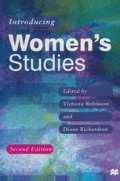Abstract
What is a chapter on methodology, specifically on how questions of methodology relate to the production of knowledge, doing in an introduction to Women’s Studies? After all, isn’t methodology boring and much less important than feminist theory or the ideas of women’s history or economics, feminist literary criticism and so on? And anyway, isn’t it just a matter of learning about techniques, such as how to carry out interviews or design surveys?
Preview
Unable to display preview. Download preview PDF.
Further Reading
Martyn Hammersley (1992) ‘On feminist methodology’, Sociology, 26, pp. 187–206.
Caroline Ramazonoglu (1992) ‘On feminist methodology: male reason versus female empowerment’, Sociology, 26, pp. 207–12.
Lorraine Gelsthorpe (1992) ‘Response to Martyn Hammersley’s paper “On feminist methodology”’, Sociology, 26, pp. 213–18.
Anne Williams (1993) ‘Diversity and agreement in feminist ethnography’, Sociology, 27, pp. 575–89.
A set of articles which debate the nature of feminist methodology, with Hammersley seeing this as both a search for a ‘feminist method’ and the source of an anti-reason bias, while Ramazonoglu emphasises the ways in which this argument is in fundamental opposition to feminist tenets about the masculinism of how ‘reason’ and ‘science’ are understood. Gelsthorpe argues that experience and reason are not polarised in the ways suggested, and Williams points out that, contrary to Hammersley’s insistence on uniformity, feminist responses to questions of methodology are considerably more diverse and contain a range of positions concerning reflexivity, power and knowledge.
Sandra Harding (ed.) Feminism and Methodology (Buckingham, Open University Press, 1987).
A highly influential reader, the introduction of which is concerned with ‘method, methodology and epistemology’ and especially epistemology. The contributing chapters offer examples of the different feminist epistemological positions reviewed earlier by Harding: successor science, standpoint and post-modern.
Mary Maynard and June Purvis (eds) Researching Women’s Lives from a Feminist Perspective (London, Taylor & Francis, 1994). A collection derived from a Women’s Studies Network (UK) conference. Contains useful short and accessible contributions offering a wide variety of examples from people at all stages in their academic lives. However, not all feminist research is concerned with ‘women’s lives’ necessarily, and so the utility of many of the ideas advanced needs to be considered in relation to research on men, gender relations and children.
Shulamit Reinharz Feminist Methods in Social Research (Oxford University Press, 1992). A useful overview of the feminist use of the range of social science methods available, although its roughly equal length chapters gives a rather skewed impression, for certainly in published work feminist use of the survey, followed by interviews, far outweighs the utilisation of other methods.
Liz Stanley (ed.) Feminist Praxis: Research, Theory and Epistemology in Feminist Sociology (London, Routledge, 1990a).
The introductory chapters look at ‘the academic mode of production’ from a feminist perspective and review in detail a wide range of contributions to the debate about feminist methodology. The other chapters discuss issues which arose in a very wide range of different kinds of feminist research projects, with an emphasis on looking at epistemology in an accessible and grounded way.
Editor information
Editors and Affiliations
Copyright information
© 1997 Liz Stanley
About this chapter
Cite this chapter
Stanley, L. (1997). Methodology Matters!. In: Robinson, V., Richardson, D. (eds) Introducing Women’s Studies. Palgrave, London. https://doi.org/10.1007/978-1-349-25726-3_9
Download citation
DOI: https://doi.org/10.1007/978-1-349-25726-3_9
Publisher Name: Palgrave, London
Print ISBN: 978-0-333-68470-2
Online ISBN: 978-1-349-25726-3
eBook Packages: Palgrave Social & Cultural Studies CollectionSocial Sciences (R0)

